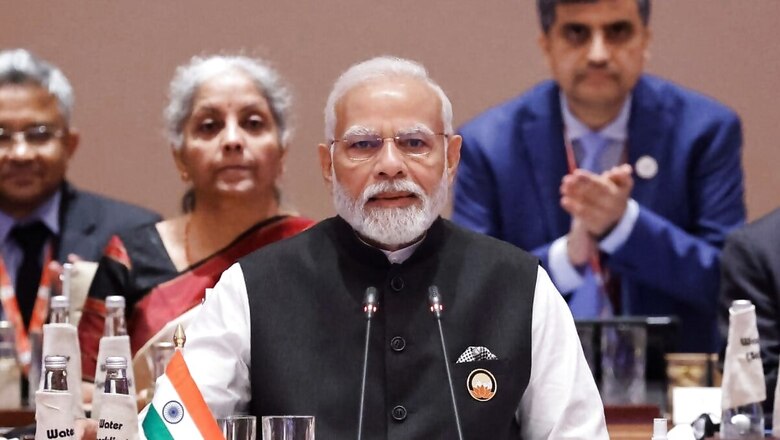
views
Narendra Modi’s recent visit to Kyiv, the first by an Indian Prime Minister since 1991, appears to signal a shift from India’s previously passive stance on the Ukraine war. Six weeks after his embrace with Russian President Vladimir Putin in Moscow, which had the West up in arms, Modi’s recent hug with Ukrainian President Volodymyr Zelenskyy suggests that India may accept a mediation role in line with its trajectory towards global power status.
However, the lack of tangible outcomes, coupled with the contrast between Modi’s references to peace and the heavy barrage of missiles that struck Kyiv shortly after his departure, serves as a reminder that India’s prized flexibility could potentially become its Achilles’ heel.
India’s foreign policy aspirations were clearly demonstrated during the 2023 G20 conference in New Delhi, where it unveiled the blueprint for an ambitious ship-to-rail transit network, the India-Middle East-Europe Economic Corridor (IMEC). As mega-infrastructural projects like IMEC and the Belt and Road Initiative (BRI) emerge as new tools of great power competition, the announcement marked New Delhi’s historic acknowledgement that it is time to translate the country’s economic rise into strategic influence extending beyond its region.
IMEC, though never officially positioned as an alternative to the BRI, poses a challenge to Beijing’s influence and establishes a link to the energy-rich GCC (Gulf Cooperation Council) and Europe. Its success would enable India to market itself as a driver of development, but without China’s predatory image. IMEC also offers an alternative to the Suez Canal, a vital but – as recent Houthi attacks in the Red Sea have shown – vulnerable gateway.
From the West’s perspective, India’s proactive stance is a welcome development. As the West seeks to derisk from China, India emerges as a logical counterpart for a friend-shoring long-term strategy. While there are lingering questions about India’s development trajectory, New Delhi offers long-term economic potential comparable to that of Beijing, without the risks to supply chains posed by China’s unfair trade practices and the non-zero chances of future military tensions. Moreover, India’s rise as a leader of the Global South could result in a less aggressive posture from China, driven by a competitive dynamic.
However, IMEC also signifies a notable shift from India’s traditional posture of non-alignment. This project, which spans three continents, reflects an implicit reassessment of India’s foreign policy and a more direct engagement in global affairs. The real test will be navigating the complex diplomatic shifts in a region like the Near East, whose future is as uncertain as it is crucial to the corridor’s success.
In addition, IMEC further involves India in the trajectory of the Gulf and Europe’s exposure to China. Although Gulf countries view IMEC as an opportunity, their recent posture has been one of hedging between the West and China, a strategy they may continue despite their significant investment in India as a rising economic power.
As for the EU, while Brussels certainly aims to increase commercial ties with India and reorganise supply chains, a trade war with China is a scenario it is determined to avoid. The shift from decoupling to de-risking is a European concept, reflecting the significant risks that the EU’s major economies would face in a disentanglement scenario from China.
All in all, the containment of Chinese projection and the reduction of economic exposure to Beijing are natural drivers of strategic convergence between India and the West.
Several European countries, including Italy during its G7 presidency, have attempted to fuel this synergy. IMEC is envisaged as complementary to the EU Global Gateway, the Partnership for Global Infrastructure and Investment (PGII), and Rome’s Mattei Plan for Africa. In this enlarged vision, Italy has a crucial role to play as a strategic terminal in the Mediterranean Sea. Trieste – as a vital Italian port at the heart of industrial Europe and one of the key platforms interconnecting major European economic corridors – could be the perfect final stop for IMEC.
However, it remains unclear how Delhi can reconcile these ambitions with its traditional non-alignment posture. Becoming a global power will require India to be more decisive on virtually every issue at hand and arguably become a different creature. This transformation should occur within the framework of a coherent strategic concept, with the most natural path being a stronger and deeper alliance with the world’s democracies. While its growth provides Delhi with leverage in its relations with the West, its long-term challenge is against China and, despite long-standing military ties, Russia.
Indeed, as the war in Ukraine continues, Russia will be the most definitive test for India’s geopolitical ambitions. The benefits of cheap Russian gas and concerns over Moscow’s subordination to China could drive India and NATO’s long-term strategies apart. India’s longstanding friendship with Russia and its historical suspicion of the West’s stance towards Pakistan will also play a significant role. Despite these doubts and challenges, India must make a choice. Clinging to its tradition of non-alignment will only underscore the inconsistency between its enormous potential and its failure to fully exploit it.
Unlike Europe, India is making strides towards becoming a net contributor to global stability. The potential benefits for India, the West, and the rules-based order could be vast—provided Delhi can shed the constraints of its past and make a full leap forward.
Giulio Terzi di Sant’Agata is Senator of the Republic of Italy; Beniamino Irdi is Senior Fellow of the Atlantic Council’s Scowcroft Centre for Strategy and Security. Views expressed in the above piece are personal and solely those of the author. They do not necessarily reflect News18’s views.













Comments
0 comment